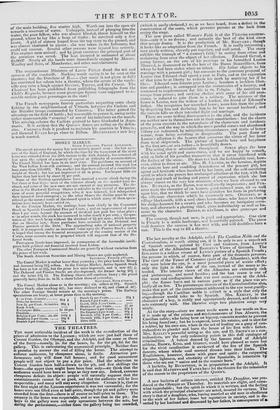THE THEATRES.
THE most noticeable incident of the week is the re-reduction of the prices of admission to the Lyceum ; which are now just half those of Covent Garden, the Olympic, and the Adelphi, and the same as those of the Surry—namely, 2s. for the boxes, Is. for the pit, 6d. for the gallery. This is caricaturing the economical principle. Neither does it pronfise to answer the end of filling the house. The attempt to enforce audiences, by cheapness alone, is futile. Atrractive per- formances only will draw full houses ; and for good amusement people will not object to pay a fair price. Had the admission to Covent Garden been half-a-crown to the pit, and five shillings the boxes—the upper tiers might have been four only—we think that the audiences would have been as large as they now are. Indeed, extreme cheapness defeats its object: people will naturally suppose that the entertainments cannot be so good, and that the audience will be less respectable ; and many will stay away altogether. Certain it is, that on the first night of the Lyceum experiment it was not successful ; for the boxes were not filled even at half-price, though the pit and gallery were crowded from the first—there is of course no half-price to them. The ompariy in the boxes was respectable, and so was that in the pit: the boys in the gallery were not only uproarious between the acts, but duruig the performance,—either from the gallery being too crowded,
(which is easily obviated,) or, as we have heard, from a defect in the construction of the seats, which prevents persons at the back from seeing the stage.
The new piece called Woman's Faith is of the Victorine construe- tion—only it is no dream ; and certainly the best of the kind since that UnifilIe drama. It is the production of Mr. BARNARD ; though
it looks like an adaptation from the French. It is really interesting; very nicely written, cleverly put together, and well acted. The story exhibits the triumph of " a woman's faith," in saving from crime and reclaiming from error the object of leer affection. Edouard Gerval, a young farmer, on the eve of his marriage to his betrothed Louise Montvel, is discovered to be the heir of time Baron Beauvilliers, from whom he had been stolen when an infant. His father objects to his marriage with a peasant-girl ; but consents to the generous proposal of Louise that Edouard shall spend a year in Paris, and at the expiration of' that term be at liberty to redeem his troth by marrying her if be likes. Edouard soon forgets poor Louise ; becomes a reckless liber- tine and gambler; is entrapped into the commission of a forgery, and sentenced to imprisonment for life in St. Pelagie. He contrives to escape from prison ; and seeking shelter with some of his old asso- ciates, is induced to join them ill a robbery. The mistress of the house is Louise, now the widow of a banker, the friend of Edouard', father. She recognizes her wretched lover; saves him from the police by disguising him and declaring him to be her second husband; and the curtain falls on their intended flight and marriage. There are some trifling discrepancies in the plot, and the incident. are neither new in themselves nor in their construction : but the charm of the piece consists in the naturalness of the characters and incidents generally, and the way in which the most painful scenes and abandoned villany are redeemed, by mitigating circumstances and traits of better nature, from being revolting or disagreeable. The pure flame of Louise's affection is the beacon that preserves the virtue of her lover from total shipwreck. The picture of bumble love and happiness in the first act—or revs rather—is beautifully drawn.
The acting also is admirable throughout. SERLE plays the hero vial his usual spirit and earnestness, and we are happy to remark, with so little of his peculiar mannerism that it never interfered with the feeling of the scene. Ile does int look the fashionable roue, how- ever, either in dress or air. Mrs. H. CRAMER, as the heroine, depicts the anxious love and confiding devotedness of the peasant girl, her agony and fortitude when insulted by her lover, and the self-sacrificing spirit in which she proves her unchanged affection at the last, with that delicacy and truth of feeling and power of expression which she has always shown on the very few occasions when we have chanced to see her. It Catea1.1., as the Baron, was unalLetedly impressive ; and PER- KINS made the character of an honest, good-natured man, sit so well upon him, that we think he must have mistaken his forte in preferring the villanous characters which he commonly acts. °MERRY, as a village blacksmith, with a soul above horse-shoes, who longs to change his sledge.hammer for a sword, and who becomes an intriguing secre- tary, and afterwards a plotting thief, gives individuality as well as hu- mour to the character. ROMER, as a bellinan, is also grotesque and amusing.
The scenery, though not new, is good and appropriate. One view in Picardy is a noble landscape, and beautifully painted. The piece well deserves the success it has met with, and will doubtless have a run. This is the way to 611 a theatre.


























 Previous page
Previous page